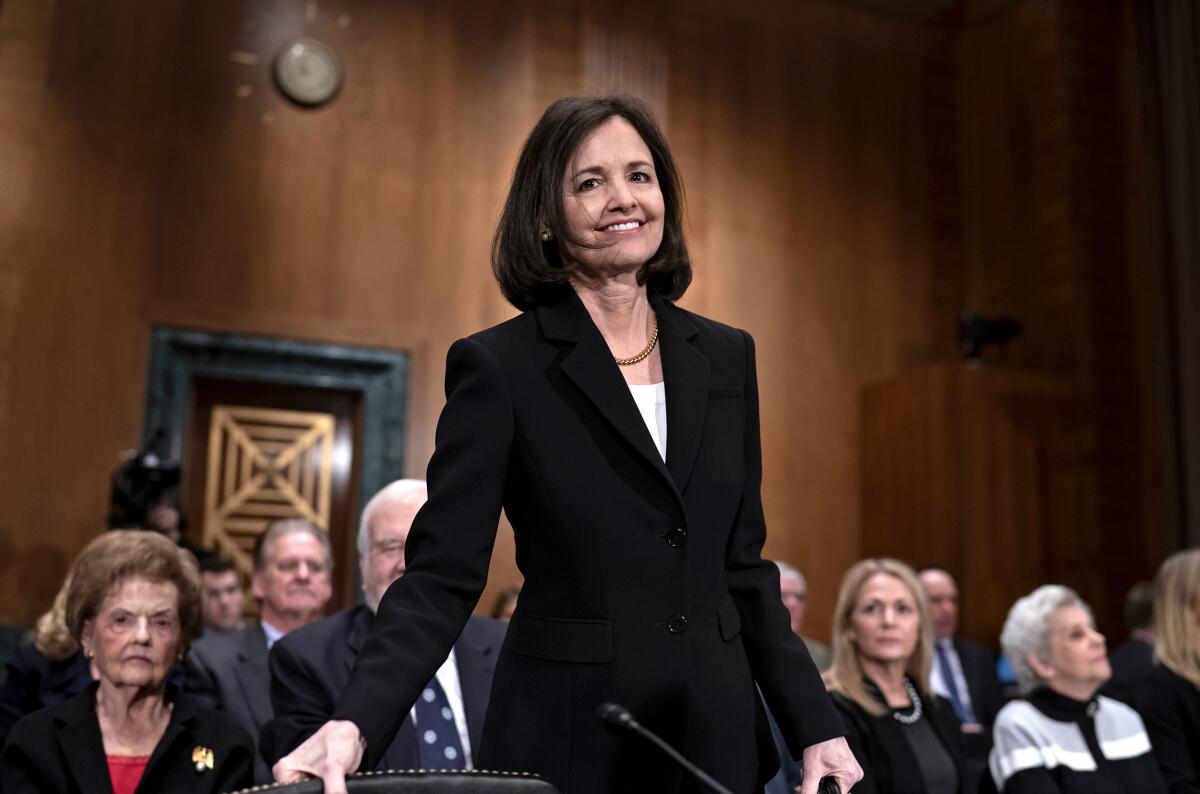Editorial: Mitch McConnell tried to push through another bad Trump nominee. This time, he failed

- Share via
It is a depressing sign of the times that a federal institution as independent and supposedly nonpartisan as the Federal Reserve would become a target of Senate Republicans’ zeal to put President Trump’s stamp on everything within reach. But that was the situation Tuesday, when Senate Majority Leader Mitch McConnell (R-Ky.) forced his colleagues to vote on Trump’s nomination of Judy Shelton despite the public opposition of more than 200 economists and former Fed officials, including seven Nobel Prize winners.
Thanks to the absence of two Republican senators in quarantine, McConnell’s motion to end debate and bring Shelton to a vote failed by the thinnest of margins. Her nomination could be brought up again, but it shouldn’t be.
Aside from politics and the imminent arrival of the Biden administration, there was no pressing reason to vote on Shelton, whose eccentric views make her spectacularly ill-qualified to serve as one of the Fed’s seven governors. The board already has a majority of four Trump appointees, most notably his pick as chairman, Jerome H. Powell (who had first been appointed to the board by President Obama). Those appointees are all well regarded, notwithstanding Trump’s complaints in 2018 and 2019 that Powell was doing too little to stimulate the then-healthy economy.
Shelton, on the other hand, has been an advocate of such discredited notions as returning the United States to the gold standard and eliminating deposit insurance. More fundamentally, she appears to oppose the mission that federal law gives the central bank, which is to use monetary policy to promote full employment and combat inflation. Instead, she seems to balk at the Fed using monetary policy at all. Her nomination, to borrow a phrase from the late economist Michael Mussa, was “like asking a conscientious objector to serve as the commandant of the Marine Corps.”
And given the effects of the pandemic, there couldn’t be a worse time to put Shelton on the Fed, which has done yeoman’s work in propping up the economy while a polarized Congress watches idly from the sidelines. Her desire to rein in the Fed’s policies on interest rates and the supply of credit might have been an interesting counterpoint in better times. Now, however, they come across as tone-deaf.
The bigger problem here is that only three Republican senators — Lamar Alexander of Tennessee, Mitt Romney of Utah and Susan Collins of Maine — were willing to buck the president in defense of the Fed against a clearly bad nominee. Why the display of such fealty to the soon-to-be-former president on an issue vital to the economy but obscure to their constituents? One guess is that, like some Republican senators, Shelton appears to want a less independent Fed (a point Collins made in opposing her). The last thing the country needs is a central bank that blows with the political winds, incapable of making hard decisions to combat inflation or unemployment.
There’s a long tradition of the Fed’s balance being preserved by presidents nominating more and less conservative economists for its board in equal numbers. Trump abandoned that practice, but inflicted no damage — up to Shelton’s nomination. The Senate should keep it that way.
More to Read
A cure for the common opinion
Get thought-provoking perspectives with our weekly newsletter.
You may occasionally receive promotional content from the Los Angeles Times.









